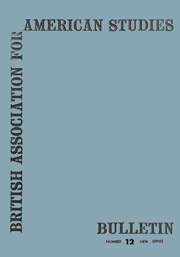No CrossRef data available.
Article contents
Pigment and Ether: A Comment on the American Mind
Published online by Cambridge University Press: 17 February 2011
Extract
Tocqueville once made the extremely penetrating observation that the American mind tends to oscillate between ideas that ‘are all either extremely minute and clear or extremely vague’ and with a view to illustrating the relevance of this remark to American literature I want to start by juxtaposing two quotations from writers separated by almost a century. First, Margaret Fuller, a leading female transcendentalist; ‘Are the stars too distant, pick up that pebble that lies at thy feet, and from it learn the ALL.’ Second, some lines from the end of Sherwood Anderson's novel entitled Poor White. There Hugh McVey, disillusioned by and alienated from the industrial society which hems him in, breaks one of his business journeys and goes down to the beach at Sandusky where he picks up some pebbles from the sands. He renews his journey and as the train passes through depressingly ugly factory towns, he plays with the stones. ‘There was relief for his mind in the stones. The light continually played about them, and their colour shifted and changed. One could look at the stones and get relief from thoughts.’ Those little stones, as Anderson explained in his A Story Teller's Story, gave comfort because they could be seen to ‘glisten and shine outside the muddle of life.’
- Type
- Research Article
- Information
- Copyright
- Copyright © British Association for American Studies 1963




